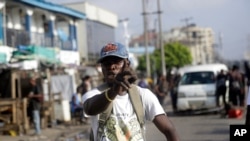Demonstrators in Lagos defied a daylong curfew Wednesday to hold new protests against police brutality, a day after an incident in which soldiers allegedly opened fire on a protest at a toll gate.
As fires were seen burning across Lagos Wednesday, residents reported hearing gunfire across the state, including at the Lekki toll plaza, the focal point of almost two weeks of protests throughout the country against allegations of systemic police brutality.
Governor Babajide Sanwo-Olu tweeted Wednesday that one person died at the city’s Reddington Hospital “due to blunt force trauma to the head,” but he said it was “an isolated case.” Sanwo-Olu said authorities are investigating to determine if the person was a protester.
The governor had initially tweeted that 30 people were injured in the shooting at Lekki Toll Plaza, an upscale district in the country’s largest city and financial hub. Sanwo-Olu said 25 people were being treated for mild to moderate injuries at two hospitals, with two people in intensive care, and three others treated and released.
“This is the toughest night of our lives as forces beyond our direct control have moved to make dark notes in our history,” the governor wrote in a series of tweets accompanied by photos of his visits with the victims. “I recognize the buck stops at my table and I will work with the FG [federal government] to get to the root of this unfortunate incident and stabilize all security operations to protect the lives of our residents.”
One eyewitness, Akinbosola Ogunsanya, told news outlets that soldiers pulled into the plaza and after the lights were turned off, began shooting. Ogunsanya said he saw about 10 people being shot and security forces removing bodies.
Another eyewitness, Chika Dibia, said soldiers confined people as they fired at them, while photographer Inyene Akpan said more than 20 soldiers arrived at the scene and began firing their weapons.
The Nigerian army posted a long thread on its Twitter account dismissing news reports of its role in the Lekki Toll Plaza shootings as “fake news.”
Reports of the shooting came on the first night of a 24-hour curfew, imposed by Governor Sanwo-Olu, which prohibits all but essential workers and first responders from being on the streets after 4 p.m. local time. A spokesman for the governor, Gboyega Akosile, said on Twitter that the Lagos state government has ordered an investigation.
In a statement Wednesday that did not refer to the toll plaza shooting, President Muhammadu Buhari appealed for calm while acknowledging a need for police reforms in the West African country.
Reaction from abroad
The U.S. government is warning Americans in Nigeria to exercise caution as protests in the West African nation have grown violent.
In a statement Tuesday, the U.S. Embassy and Consulate in Nigeria urged U.S. citizens “to avoid areas around protests and demonstrations” and to be vigilant. It said the consulate in Lagos closed Tuesday and would remain shuttered through Wednesday.
U.S. presidential candidate Joe Biden urged Buhari and the Nigerian military to cease what he called “the violent crackdown on protesters in Nigeria.” He said the United States “must stand with Nigerians who are peacefully demonstrating for police reform and seeking an end to corruption in their democracy.”
A spokesman for United Nations Secretary-General António Guterres said in a statement Wednesday that Guterres “calls for an end to reported police brutality and abuses” and “condemns the violent escalation” Tuesday that caused “multiple deaths and caused many injuries.”
Guterres also requests that Nigerian authorities “investigate these incidents and hold the perpetrators accountable,” said spokesman Stephane Dujarric.
He said the secretary-general urges Nigerian security forces “to act at all times with maximum restraint while calling on protesters to demonstrate peacefully and to refrain from violence.”
The human rights group Amnesty International issued a statement on Twitter saying there was “credible but disturbing evidence” of fatalities from the shooting at Lekki Toll Plaza.
“While we continue to investigate the killings, Amnesty International wishes to remind the authorities that under international law, security forces may only resort to the use of lethal force when strictly unavoidable to protect against imminent threat of death or serious injury.”
The West African nation has been engulfed by two weeks of massive protests that began as demonstrations against the government’s Special Anti-Robbery Squad, commonly known as SARS. They were sparked by a video allegedly depicting a man being beaten by SARS officers. The unit has long been accused of carrying out harassment, kidnappings, extortion, torture and murder.
The demonstrations, conducted under the banner #EndSARS, led the government to disband the controversial police unit. The demonstrations have persisted, however, and turned violent as protesters demand broader changes to policing and an end to corruption.
Video taken Tuesday by a stringer for VOA’s Hausa service in the city of Jos showed angry demonstrators hurling rocks and setting fires in the middle of one street, sidewalks covered with glass from shattered windows, burned out vehicles, and uniformed and plainclothes police patrolling the streets.
“We need a new Nigeria. That is why we’re here,” protester David Danladi told VOA Hausa. “We need everything about the police to be changed.”
“We need someone that is going to address, that is going to tell us, ‘Look, we have heard your cry. We have heard your demands,’” Danladi said. “That is the change that we want.”
At least 10 people have died since protests began earlier this month.
